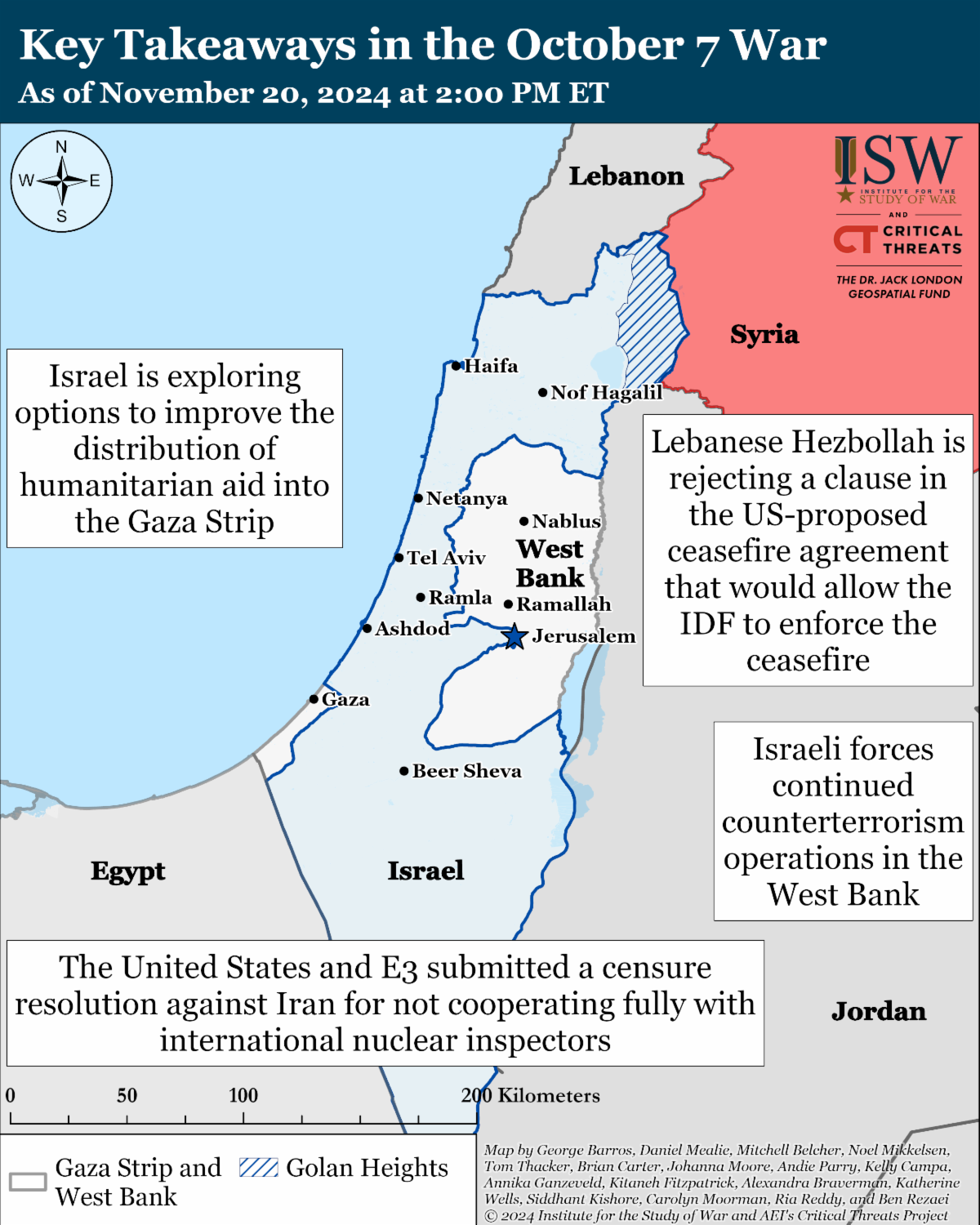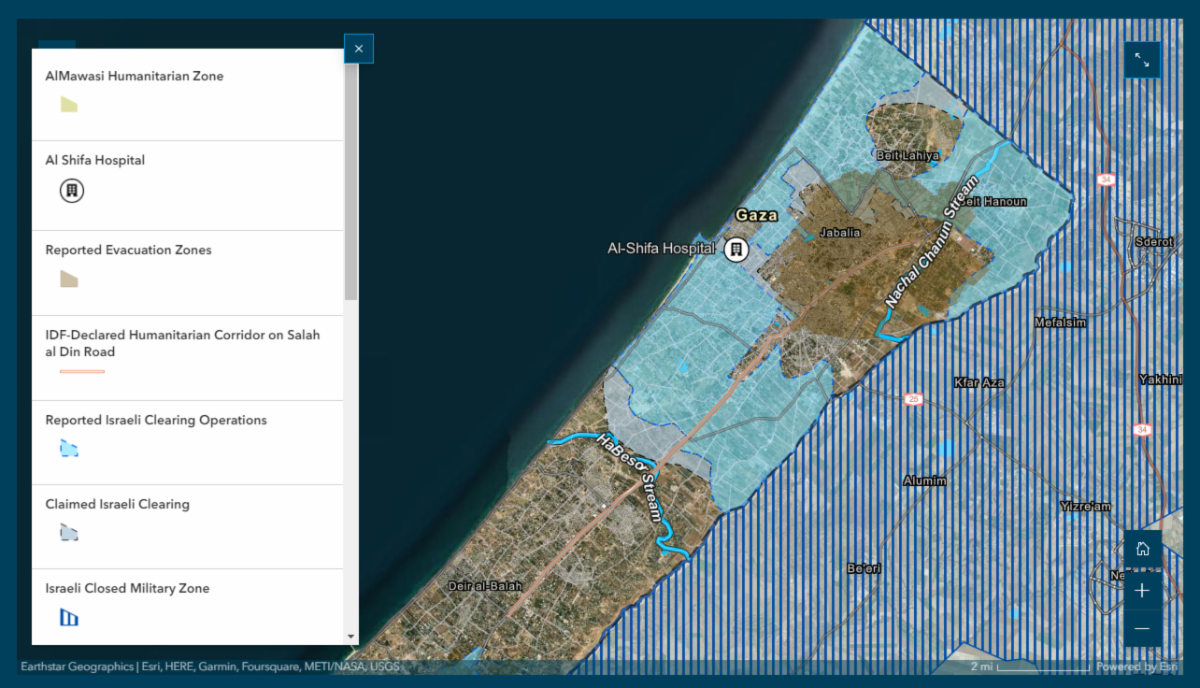Lebanese Hezbollah Secretary General Naim Qassem announced in a November 20 speech that Hezbollah would require a permanent ceasefire and the preservation of Lebanese sovereignty in any agreement with Israel. Qassem clarified that maintaining Lebanese sovereignty requires preventing Israel from operating in Lebanon “whenever [Israel] wants” and refuted that Israel could “impose its conditions” on Hezbollah. Qassem is referring to the current US-proposed ceasefire agreement that would allow Israel to continue to attack Hezbollah targets in southern Lebanon if UNIFIL or the Lebanese Armed Forces (LAF) fail to enforce the ceasefire. The draft agreement includes a clause that states that Israel retains its right to self-defense, and the United States sent to Israel a side letter that stipulates US support for the Israeli right to respond with force to Hezbollah threats. Israeli Foreign Affairs Minister Gideon Saar and Defense Minister Israel Katz reiterated on November 20 that Israel requires that it retain its ability to “act and defend Israeli citizens from Hezbollah” in any agreement.
Removing these clauses from the ceasefire agreement would likely enable Hezbollah to gradually re-arm and re-entrench itself in southern Lebanon. The current ceasefire agreement provides no other sufficient mechanisms to ensure that Hezbollah remains disarmed in southern Lebanon. UNIFIL and the LAF would be the only other parties responsible for observing and enforcing Hezbollah’s withdrawal and disarmament in southern Lebanon. CTP-ISW continues to assess that it is extremely unlikely that UNIFIL or the LAF would be willing or able to enforce Hezbollah’s disarmament given their previous failures to enforce UN Security Council Resolution 1701 in southern Lebanon since 2006. The LAF, which would be responsible for dismantling Hezbollah infrastructure and enforcing disarmament, is particularly unlikely to directly confront Hezbollah.
US special envoy Amos Hochstein met with Lebanese Parliament Speaker Nabih Berri for a second day in Beirut to discuss the Hezbollah response to the US-proposed agreement. Hochstein returned to Israel and will meet with Israeli Prime Minister Benjamin Netanyahu for further consultations on November 21.
Qassem, in his speech, continued trying to project Hezbollah strength and resilience against Israeli operations in Lebanon. Qassem promised to attack “the center of Tel Aviv” in retaliation for recent Israeli airstrikes in northern and central Beirut. Qassem reiterated that Hezbollah is not a regular standing army and that the group will rapidly attack and ambush Israeli forces as they enter Lebanon. Qassem also continued to grossly exaggerate the success of Hezbollah operations in Israel and the number of IDF casualties and material damage. Qassem asserted that Hezbollah would survive politically after the war and work with the LAF and people to rebuild Lebanon.
Key Takeaways:
- Lebanon: Lebanese Hezbollah is trying to remove a clause in a US-proposed ceasefire agreement that allows Israel to strike Hezbollah targets if Hezbollah violates the ceasefire. Removing these clauses would enable Hezbollah to gradually re-arm and re-entrench in southern Lebanon.
- Lebanon: Documents seized by the IDF in the Gaza Strip highlight Iranian efforts to promote interoperability between Hamas and Lebanese Hezbollah. The documents depict Iran-Hamas discussions to send thousands of Hamas fighters to Lebanon to integrate into Hezbollah SOF units. These units are trained to conduct ground attacks into Israel.
- Iran: The United States and E3 submitted a censure resolution against Iran to the IAEA Board of Governors in response to Iran's refusal to cooperate fully with the IAEA. Iran is trying to prevent the censure resolution from passing by threatening unspecified retaliation.
- Iraq: The Iraqi federal government is trying to prevent Iranian-backed Iraqi militia attacks on Israel in order to prevent Israeli strikes on Iraq. Iranian-backed Iraqi attacks on Israel increased by almost 150 percent between September and October 2024.
- Gaza Strip: Israel is exploring options to improve the distribution of humanitarian aid in the Gaza Strip. These considerations come amid an uptick in armed Palestinian gangs interdicting aid convoys and looting them.
| 






 [ISW] 이란 업데이트, 2025년 1월 13일
[ISW] 이란 업데이트, 2025년 1월 13일
 [ISW] 이스라엘-하마스 전쟁(이란) 업데이트, 2024년 11월 18일
[ISW] 이스라엘-하마스 전쟁(이란) 업데이트, 2024년 11월 18일